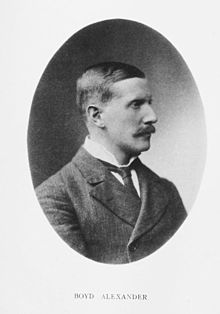Boyd Alexander
Boyd Alexander (born January 16, 1873 in Cranbrook , United Kingdom of Great Britain and Ireland , † April 2, 1910 near Nyeri, Chad ) was a British officer , researcher and ornithologist .
Career
Boyd Alexander was born in 1873, the eldest son of Lieutenant Colonel Boyd Francis Alexander, during the reign of Queen Victoria in traditional Kent . His maternal grandfather was David Wilson , the founder of the Great Eastern Hotel in Calcutta . He had at least one brother named Claud († 1904). Nothing is known about Boyd Alexander's youth.
Alexander enlisted in the 7th Battalion of the Rifle Brigade (Prince Consort's Own) in 1893 . He was promoted to captain until 1898 .
At the end of the 19th century, Alexander led scientific expeditions to the Cape Verde Islands (1897–1898) and the Zambezi and Kafue rivers (1898–1899) to study the avifauna there. Alexander entered 1899 in the police force of the Gold Coast and took in 1900 to the relief of Kumasi in part, for him a medal and clasp were awarded. Upon his return to Great Britain he was offered an officer license in the Rifle Brigade, which he received in October 1900. He was promoted to lieutenant on January 22, 1902. In 1902, Alexander led a scientific expedition to Fernando Po , during which he successfully climbed Mount St. Isabel and discovered many new species of birds.
Between 1904 and 1906 Alexander led the Alexander Gosling expedition in Africa , traveling from Niger to the Nile . The aim of the expedition was to show that the continent could be crossed from west to east via its waterways. Alexander was accompanied on the expedition by his brother Captain Claud Alexander, his assistant and taxidermist José Lopes, Captain GB Gosling and PA Talbot. In February 1904 they set out from the mouth of the Niger and traveled upriver to Lokoja . His brother died in October 1904 of complications from typhus after surveying the Murchison Range . Talbot returned to the west in mid-1905. Boyd, Gosling and Lopes then explored the area around Lake Chad . In June 1906 Gosling died in Niangara as a result of blackwater fever . Alexander and Lopes followed the Kibali and reached the Nile in December 1906. In February 1907 they returned to Great Britain, where Alexander resigned from the army.
For his journey across the continent, Alexander was awarded the Gold Medal by the Royal Geographical Society in Antwerp in 1907 and the Founder's Gold Medal by the Royal Geographical Society (RGS) in London in 1908 . In 1907 he became an honorary member of the Royal Scottish Geographical Society (RSGS).
At the end of 1908, Alexander and Lopes sailed back to Africa. They visited the islands of São Tomé and Príncipe , Mount Cameroon and Lake Chad. Alexander intended to go to Egypt as well, through the Wadai and Darfur regions . There was a lot of instability in the country at that time. On reaching Nyeri - which was 70 miles north of Abéché , the capital of Wadai - Alexander was murdered by locals on April 2, 1910. Lopes, who had accompanied him since his trip to the Cape Verde Islands, fled. Alexander's body was buried with his brother Claud near Maifoni.
Honors
A memorial for the two brothers is in the Parish Church of St. Dunstan in Cranbrook (Kent). In addition, several mammals and birds were after him named , such as the Alexander sailors ( Apus alexandri ), the Alexander's Kusimanse ( Crossarchus alexandri ) and the Alexander Bush Squirrel ( Paraxerus alexandri ).
Works
- 1907: From the Niger to the Nile (travel report)
literature
- Ogilvie-Grant, WR: Boyd Alexander and his ornithological work , 1910, pp. 716-729, doi : 10.1111 / j.1474-919X.1910.tb07928.x
- Forbes, Edgar Allen: Across Central Africa By Boat: The Alexander-Gosling Expedition Through The Heart Of The Sudan , The World's Work: A History of Our Time, Volume 15: 10080–10090, April 1908
- Mearns, Barbara and Richard: Biographies for Birdwatchers, ISBN 0-12-487422-3
Individual evidence
- ↑ a b c d e f g h Collection Level Description: Diary of Boyd Alexander, relating to a journey from the Niger to the Nile , Bodleian Library University of Oxford
- ↑ No. 27442 - Boyd Alexander , The London Gazette, June 13, 1902, p. 3900
- ↑ a b Alexander, Boyd: From the Niger to the Nile , 1907
- ↑ Bo Beolens, Michael Grayson, Michael Watkins: The Eponym Dictionary of Mammals. Johns Hopkins University Press, 2009; P. 7; ISBN 978-0-8018-9304-9 .
| personal data | |
|---|---|
| SURNAME | Alexander, Boyd |
| BRIEF DESCRIPTION | British officer, researcher and ornithologist |
| DATE OF BIRTH | January 16, 1873 |
| PLACE OF BIRTH | Cranbrook , United Kingdom of Great Britain and Ireland |
| DATE OF DEATH | April 2, 1910 |
| Place of death | near Nyeri, Chad |
